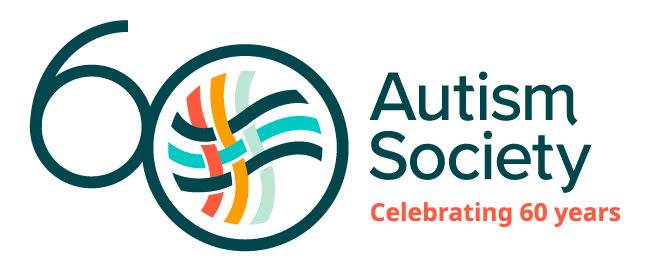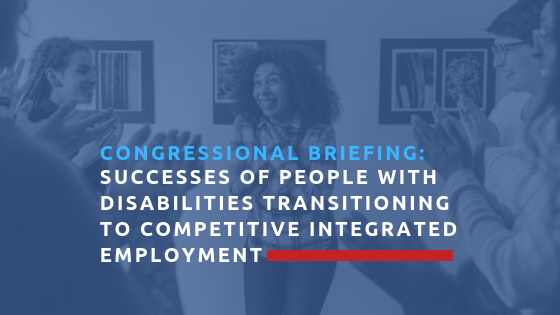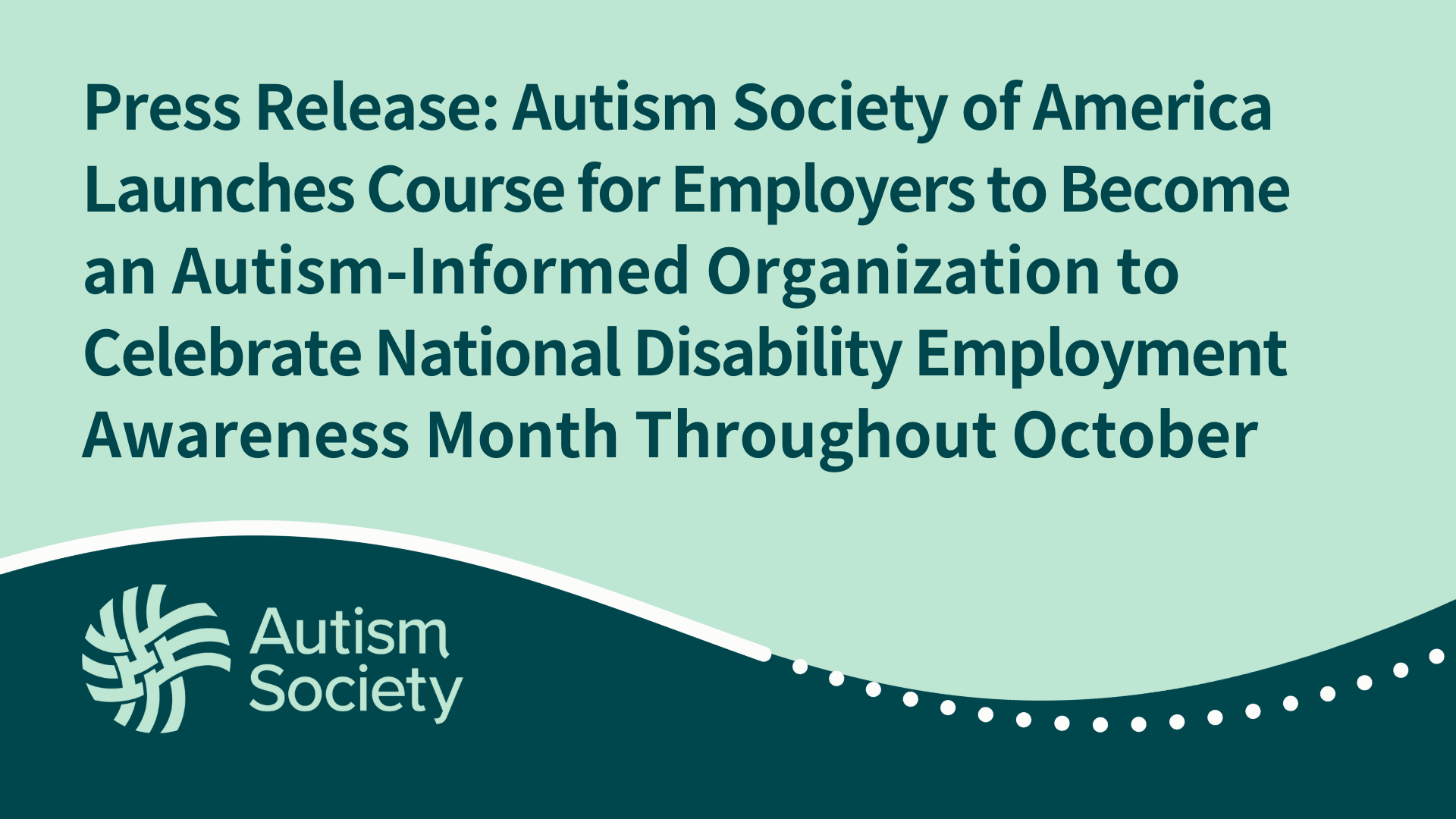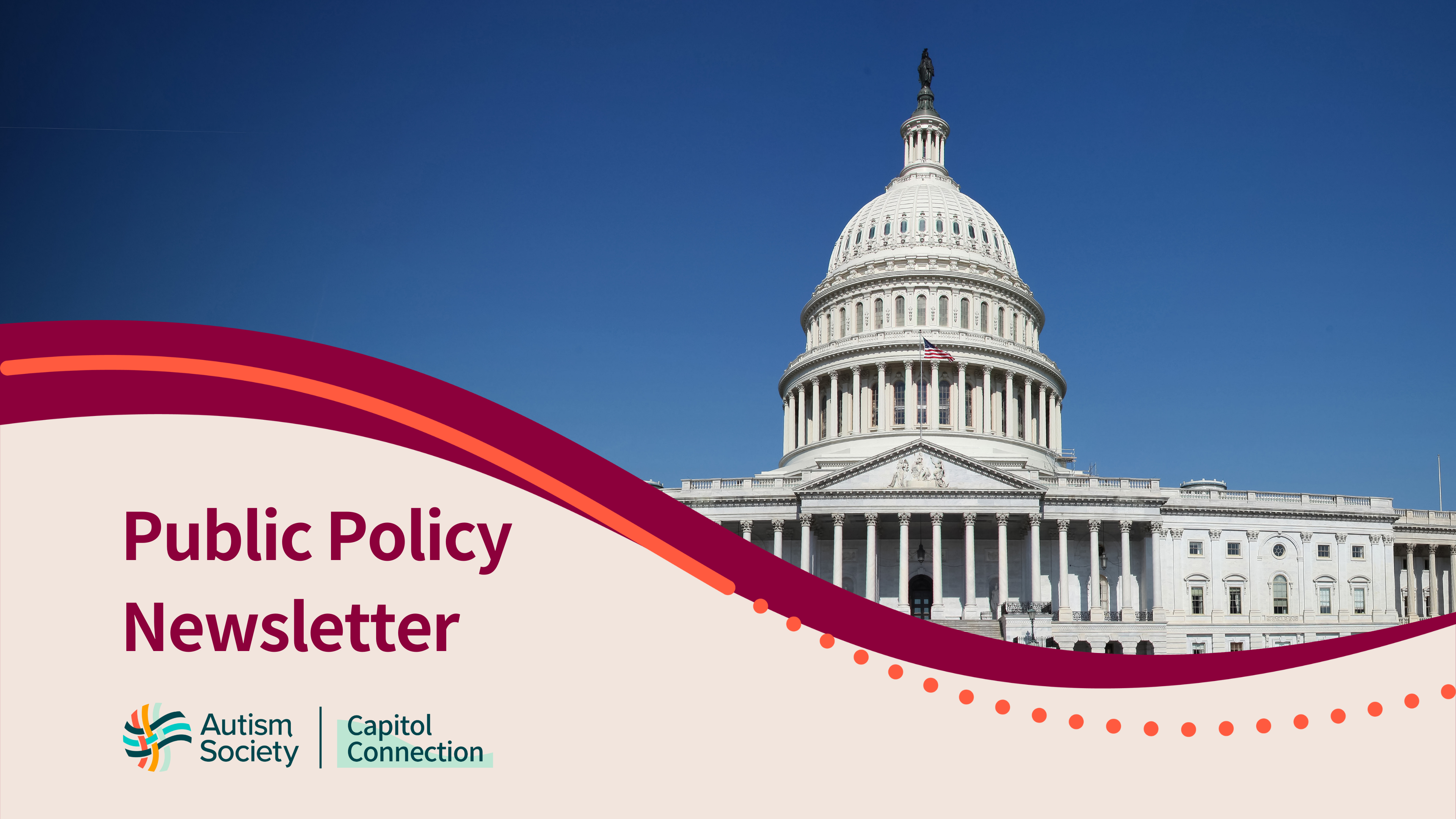
In this issue of Capitol Connection, find a summary of the President’s Fiscal Year 2023 Budget request, highlights from the Disability Policy Seminar, and a new funding announcement related to the Money Follows the Person program.
Disability Policy Seminar
It was great to see over 900 disability advocates from across the United States attend the Disability Policy Seminar last week in person and virtually. Sessions covered updates from the Administration represented by HHS Secretary Xavier Becerra, ACL Administrator Alison Barkoff, ED Assistant Secretary Katy Neas, and Jennifer Mathis, DOJ Office on Civil Rights.
A number of Members of Congress participated virtually, including Senators Casey (PA) and Murphy (CT) spoke on the continued urgency for an increase in funding for home and community-based services and school climate bills, respectively. Congressional staff also participated to speak on issues of housing, employment, education, criminal justice, and Social Security. For a special surprise, Majority Whip James Clyburn (SC) came and spoke on the importance of voting.
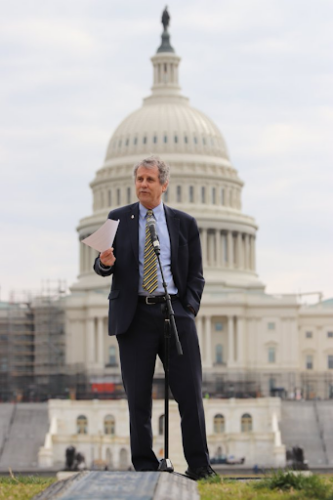
Senator Sherrod Brown (OH) speaks to the Disability Policy Seminar rally participants (photo credit goes to TASH).
Even if you were unable to participate in the seminar, we encourage affiliates to make appointments with their Members of Congress and staff on their own time to share personal stories and urge action on critical issues facing people with Autism. Fact sheets are still available online on many of the issues discussed at the seminar. Please use our action alert to contact your Senators with personal stories on how HCBS funding affects you and your loved ones.
Earmarks & Community Projects
We recently heard this week, that if you are planning to ask your members of Congress for funding for an earmark in your state or county, this is the final week for many Members of Congress. Each Member of Congress is permitted to request three special projects.
Earmarks are simply member-directed (non-competitive) grants that are included within the discretionary appropriations bills and amount to a small percentage of the federal discretionary budget.
Contact your Representative or one of your Senators to find out their deadline and to receive an application or search on their websites. You can find out who your Members are by using your zip code in the Autism Society’s Action Center (see Find your Elected Officials).
Appropriations Committee Chair Rosa DeLauro’s created a memo outlining the process for earmarks. The memo includes a template for requesting an earmark and further guidance and requirements. Please contact kmusheno@autism-society.org with any questions.
President Biden’s Budget
On March 28, just weeks after Congress passed and the President signed the final appropriations bills for Fiscal Year 2022, President Biden released his Fiscal Year 2023 Budget. The Autism Society is pleased to see a number of important increases in the proposed budget for programs that support people with Autism and other disabilities. Following is a brief summary and table comparing the FY23 budget with the final FY22 final appropriations for programs within the Departments of Labor, HHS, Education, and Department of Justice.
| FY 2022 Funding Request for the Departments of Labor, HHS, Education and Justice
(in millions) |
||||
| FY 2021 Enacted | FY 22 Enacted | President FY 2023 Request | Difference between FY 22 Final and FY 23 Request | |
| Department of Health and Human Services | ||||
| University Centers (UCEDD) | 42.0 | 42.0 | 47.0 | +5.0 |
| Projects of National Significance | 8.0 | 9.0 | 25.0 | +16 |
| DD Councils | 79.0 | 80.0 | 88.5 | +.50 |
| Protection & Advocacy | 42.0 | 42.0 | 60.0 | +18,0 |
| Lifespan Respite Act | 7.0 | 8.0 | 14.0 | +6.0 |
| National Family Caregivers | 189.0 | 194.0 | 250.0 | +56.0 |
| Health Resources and Services Administration (HRSA) | ||||
| Maternal and Child Health Block Grant | 712.7 | 748.0 | 954.0 | +206.0 |
| Autism CARES | 53.0 | 54.0 | 57.0 | +3.0 |
| Centers for Disease Control and Prevention (CDC) | ||||
| Center on Birth Defects and DD (NCBDDD) | 168.0 | 177.0 | 195.0 | +18.0 |
| National Institutes for Health | ||||
| NICHD | 1,590.0 | 1,683.0 | 1675.0 | +8,00.0 |
| NIMH | 2,100.0 | 2,200.0 | +10 | |
| Department of Education | ||||
| IDEA Part B | 12,937.5 | 13,000.0 | 16,000.0 | +300.0 |
| Part C Early Intervention | 482.0 | 496.0 | 932.0 | +436.0 |
| Preschool Grants | 397.6 | 409.5 | 502.5 | +93.0 |
| IDEA Part D programs | ||||
| State Personnel Development | 38.6 | 38.6 | 38.6 | 0.0 |
| Technical Assistance | 44.0 | 44.0 | 49.0 | +5.0 |
| Personnel Preparation | 90.0 | 95.0 | 250.0 | +150.0 |
| Parent Information Centers | 27.0 | 30.0 | 45.0 | +15.0 |
| Education technology | 30.0 | 30.0 | 30.0 | 0.0 |
| Postsecondary Program for ID | 14.0 | 14.0 | 15.0 | +1.0 |
| Supported Employment | 23.0 | 23.0 | 23.0 | 0.0 |
| Department of Justice | ||||
| Kevin and Avonte’s Law | 3.0 | 3.0 | 3.0 | 0.0 |
DD Act Programs
The budget invests $160 million in four programs authorized by the Developmental Disabilities Assistance and Bill of Rights Act (DD Act) to build the capacity of systems to support community living for people with Autism and other developmental disabilities, an increase of $26 million above FY 2022 final bill. This includes $88 million for State Councils on Developmental Disabilities, $47 million for University Centers for Excellence in Developmental Disabilities, and $25 million for Projects of National Significance. ACL’s four Protection and Advocacy programs (focused on Developmental Disabilities, Voting Access, Assistive Technology, and Traumatic Brain Injury) together play a critical role in upholding the rights and protecting the safety and welfare of people with disabilities. To increase the capacity of these programs, ACL is requesting an increase of $26 million to provide $85 million in funding for these four P&A programs. Together, these programs help states develop and maintain coordinated systems of services and support for people with developmental disabilities.
Caregiving
The budget provides $266 million, an increase of $61 million above FY 2022 enacted, for the Family Caregivers and Native American Caregiver Support programs, and nearly doubles funding, from $8 million to $14 million, for the Lifespan Respite Care program. These programs provide more than 1.5 million caregivers counseling, training, respite care, and other coordinated services to allow them to support their loved ones while maintaining their own health and well-being. The budget also allows ACL to continue to support the advisory councils established by the Recognize, Assist, Include, Support, and Engage (RAISE) Family Caregivers Act and the Supporting Grandparents Raising Grandchildren Act.
AT
The FY 2023 budget for Assistive Technology includes $37 million to expand program capacity to support people with disabilities to obtain assistive technology devices and services. According to the Budget narrative, in FY20, 37,512 people received a total of 53,258 refurbished devices from 53 assistive technology programs across the country.
Health Resources Services Administration
The president’s proposal increases the Autism CARES Act Autism and Other Developmental Disorders line item to $57 million – $3 million above FY22. This funds the Leadership Education in Neurodevelopmental Disorders (LEND) program as well as research into physical and behavioral health interventions.
The budget also increases funding to Emergency Medical Services for Children ($28 million, $6 million above FY 2022 enacted) to address critical gaps in emergency and trauma care and $592 million, an increase of $24 million above FY22, for the Maternal and Child Health Block Grant to States to expand health care and public health services that currently benefit an estimated 60 million women, infants, and children.
Centers for Disease Control and Prevention (CDC)
The FY 2023 budget includes $195 million, an increase of $18 million above FY 2022 enacted, for the CDC’s National Center on Birth Defects and Developmental Disabilities (NCBDDD). This Center connects research, data, and surveillance to promote optimal health across the lifespan.
National Institutes of Health
The Budget provides an additional $3 million for the Eunice Kennedy Shriver National Institute of Child Health and Human Development (NICHD). This program supports the 16 Intellectual and Developmental Disabilities Research Centers that provide basic bench research on IDD.
The FY 2023 budget also provides an increase of $10 million to the National Institute of Mental Health (NIMH) to support studies of the social media impact on mental health ($5 million) and to support studies to inform mental health treatment approaches, service delivery, and system transformation ($5 million).
Education
The Administration requests $16.3 billion for the Grants to States program, $3.4 billion (or 24%) more than the previous fiscal year, to assist States and schools in providing special education and related services to children with disabilities ages 3 through 21. Under this request, the Federal contribution toward meeting the excess cost of special education services would be approximately 15 percent of the national average per-pupil expenditures.
The request of $502.6 million for Preschool Grants, an increase of $105 million, would assist States and schools in providing special education services to children ages 3 through 5.
The request of $932 million for Grants for Infants and Families would provide an increase of $450 million (double) to help States implement statewide systems of early intervention services for children from birth through age 2.
The IDEA personnel preparation program receives a $155 million (163%) increase to $250 million, which is part of the budget’s emphasis on creating a well-prepared and diverse educator workforce. This would support the training of tens of thousands of new teachers and service providers over the next five years. In addition, the request includes $49.3 million for Technical Assistance and Dissemination to improve the development and implementation of best practices in services delivered under the IDEA. The request also includes $45.1 million for Parent Information Centers, a historic investment in the program, to support parents and families of children with disabilities. The request maintains support for all other National Activities programs at the fiscal year 2021 level.
DOJ
Under the Department of Justice, Kevin and Avonte’s Law would be funded at the same level as FY21.
The next step is for Congress to develop its overall Budget Resolution and 12 annual funding bills. The Autism Society will advocate for the highest possible funding levels for programs important to people with Autism and their families.
Money Follows the Person
The Centers for Medicare & Medicaid Services (CMS) announced last week that it will offer more than $110 million to expand access to home and community-based services (HCBS) through Medicaid’s Money Follows the Person (MFP) program.
First authorized in 2005, MFP has provided states with $4.06 billion to support people who choose to transition out of institutions and back into their homes and communities. The new Notice of Funding Opportunity (NOFO) makes individual awards of up to $5 million available for more than 20 states and territories not currently participating in MFP. These funds will support initial planning and implementation to get the state/territory programs off the ground, which would ensure more people with Medicaid can receive high-quality, cost-effective, person-centered services in a setting they choose.
For states already participating in MFP, CMS also announced that the agency is increasing the reimbursement rate for MFP “supplemental services.” These services will now be 100% federally funded with no state share. Further, CMS is expanding the definition of supplemental services to include additional services that can support an individual’s transition from an institution to the community, including short-term housing and food assistance. These changes will help further address critical barriers to community living for eligible individuals, as well as increase community transition rates and the effectiveness of the MFP demonstration overall.
See more information on current and previous grantees. CMS will provide additional information on these changes to MFP grantees. State Medicaid agencies not currently participating in the MFP demonstration may apply through the NOFO no later than May 31. Autism Society affiliates are encouraged to work with their states to encourage them to apply for these funds and to use them to help people with Autism who want to transition into settings of their own choosing.
New Guidance from the Department of Education
On March 24, the U.S. Department of Education released a letter to educators and parents with updates and additional resources to aid in efforts to mitigate the spread of COVID-19 in schools and ensure all students can safely learn in person, to the maximum extent possible. The letter addresses the needs of students with disabilities as we move into a new phase in our response to the pandemic. Parents can use the letter to help advocate for their children’s individual health needs.
Hearing on Mental Health and Well-Being
On April 5, 2022, the House Committee on Energy and Commerce held a hearing on “Communities in Need: Legislation to Support Mental Health and Well-Being”. The hearing included testimony from witnesses including Dr. Miriam Delphin-Rittmon from the Substance Abuse and Mental Health Services Administration, Carole Johnson from the Health Resources and Services Administration, and Rebecca Brendel who is the President-Elect of the American Psychiatric Association, and a variety of other experts in the field of mental health. The hearing centered on key pieces of legislation that will work to expand mental health resources for Americans across the country. Included in the legislation discussed were the “9-8-8 and Parity Assistance Act of 2022” (H.R. 7232), the “Native Behavioral Health Access Improvement Act of 2021” (H.R. 4251), and the “Supporting Children’s Mental Health Care Access Act of 2022” (H.R. 7076). The main goal of this hearing, the testimony of the witnesses, and the legislation mentioned are to expand behavioral health care access by expanding resources including personnel, and doing outreach to underserved communities.
Share:

